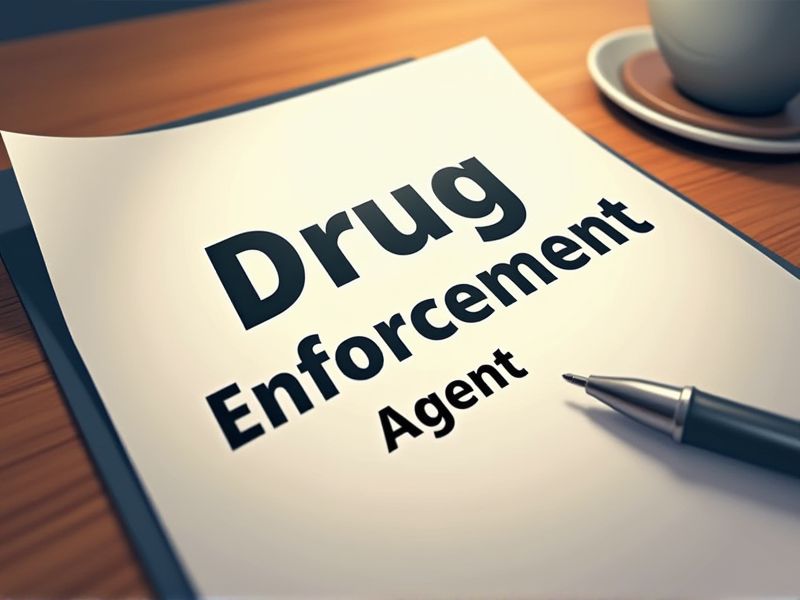
Drug Enforcement Agents operate in environments where understanding complex legal, criminal, and pharmacological information is crucial. Certain certifications equip agents with the specialized skills necessary for effective investigation and enforcement of drug-related laws. These certifications help in enhancing their ability to analyze evidence, employ tactical strategies, and navigate legal frameworks efficiently. Here are some essential certifications you may need as a Drug Enforcement Agent.
DEA Special Agent Basic Training Certification
The DEA Special Agent Basic Training Certification equips agents with necessary skills to effectively combat drug-related crimes. This certification ensures that agents are well-versed in legal, investigative, and tactical procedures essential for enforcement operations. Intensive training prepares agents to handle high-pressure situations and make informed decisions in the field. Certification enhances the credibility and readiness of agents to operate in diverse and challenging environments.
Federal Law Enforcement Training Accreditation Certification
Federal Law Enforcement Training Accreditation Certification establishes a standardized benchmark for training, ensuring Drug Enforcement Agents possess essential skills and knowledge. Accreditation enhances agent credibility, fostering public trust in their operations. Certified training programs contribute to higher operational efficiency, reducing errors and improving outcomes. Adherence to these standards supports accountability and professionalism in drug enforcement activities.
Narcotics Investigations Certification
Obtaining a Narcotics Investigations Certification provides Drug Enforcement Agents with specialized knowledge essential for identifying and understanding complex drug trafficking operations. The certification ensures agents are proficient in handling the legal aspects of narcotics cases, such as evidence collection and courtroom procedures. With increased skills, agents effectively disrupt drug supply networks, aiding in reducing substance abuse in communities. Certification also fosters coordination with other law enforcement agencies, ensuring comprehensive strategies in combating drug-related crimes.
Criminal Justice Certification
Criminal Justice Certification provides foundational knowledge of the legal system, essential for understanding drug enforcement laws. Familiarity with criminology theories enables Drug Enforcement Agents to predict and analyze criminal behavior patterns effectively. The certification imparts essential investigative skills, crucial for evidence gathering and case building. Specialized training in criminal procedure enhances agents' abilities to make informed operational decisions while ensuring compliance with legal standards.
Advanced Firearms Proficiency Certification
Advanced Firearms Proficiency Certification is essential for Drug Enforcement Agents because it enhances their ability to handle high-risk situations effectively. This certification ensures agents possess the skills to safely manage and deploy firearms, crucial in operations involving armed suspects. Increased proficiency reduces the risk of collateral damage, safeguarding the public and themselves. High-level training contributes to building trust with communities, ensuring that enforcement actions are conducted with precision and accountability.
Defensive Tactics and Use-of-Force Certification
Defensive tactics and use-of-force certification equip drug enforcement agents with the necessary skills to handle potentially violent situations safely, reducing the risk of injury to themselves and suspects. Proper training ensures agents can make quick, lawful decisions in high-pressure environments, enhancing operational effectiveness and adherence to legal standards. Drug enforcement operations often involve confronting armed and aggressive individuals, necessitating advanced defensive capabilities to maintain control and protection. Certification in these areas fosters accountability and transparency in law enforcement practices, aligning with public and agency expectations for responsible conduct.
Crisis Intervention Team (CIT) Certification
Crisis Intervention Team (CIT) Certification equips Drug Enforcement Agents with crucial skills in de-escalating situations involving individuals experiencing mental health or substance use crises. Agents with CIT training are more effective in recognizing signs of mental illness, which reduces the likelihood of confrontational or dangerous encounters. This certification supports the agency's goal of improving community trust and ensuring safer interactions. Data suggests that CIT-trained personnel experience fewer incidents of use of force, enhancing both agent safety and community dignity.
Emergency Medical Technician (EMT) Certification
Emergency Medical Technician (EMT) certification is essential for Drug Enforcement Agents because it equips them with life-saving skills during field operations where medical emergencies can arise unexpectedly. The certification enhances their ability to stabilize individuals who may experience drug overdoses while awaiting professional medical help, increasing survival rates. Drug enforcement operations often lead to high-risk environments, and having agents trained in emergency medical response can significantly reduce casualties or injuries among both civilians and team members. EMT-certified agents can provide immediate medical support during long remote missions where access to medical facilities is limited, ensuring better outcomes in terms of health and safety.
Cybercrime Investigations Certification
Cybercrime investigations certification enhances a drug enforcement agent's ability to trace illegal online drug transactions, often hidden through sophisticated cyber techniques. The training equips agents with the skills to decipher encrypted communications used by drug traffickers. It provides strategic insights into digital forensics, crucial for gathering evidence admissible in court. As drug operations increasingly leverage digital platforms, such expertise is vital for disrupting and dismantling illicit networks effectively.
Criminal Intelligence Analysis Certification
Possessing a Criminal Intelligence Analysis Certification equips a Drug Enforcement Agent with the necessary skills to interpret complex data patterns related to drug trafficking operations effectively. This certification enhances their ability to anticipate criminal activities by analyzing trends and identifying key actors, leading to more strategic interventions. The training provided in the certification helps in integrating technology and data-driven methods into investigations, which increases operational efficiency. Obtaining this certification can also establish credibility and demonstrate a commitment to professional development in a highly dynamic field.
Summary
By obtaining certifications, you can enhance your credibility and display comprehensive knowledge in drug enforcement. This can lead to increased trust from colleagues and superiors, potentially resulting in career advancement. Certified agents often have access to specialized assignments and additional responsibilities. The enhanced skills and knowledge also contribute positively to public safety and effectiveness in combating drug-related crimes.
